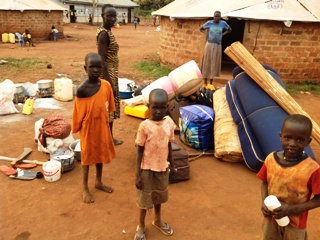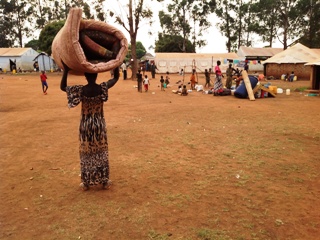S. Sudanese refugees in Uganda begin cultivation as rain approaches
February 23, 2014 (KIRYANDONGO) – Some of the South Sudanese who have sought refuge in neighbouring Uganda after fighting broke out two months ago are trying to adjust to a a new life.

As the sun begins to rise over the camp, 40-year-old Abraham Majot from Lakes state picks a hoe and a machete, locally common known as panga, to clear the are of bushy forest and grass he has been cleared to use for cultivation by local officials.
Speaking to Sudan Tribune on Sunday he said that the land must be ready to grow potatoes, maize and beans for his family before the rains begin in March or April.
Like the other refugees, Majot is not used to the hilly nature of the land in Kiryandongo. But he is determined to adapt to his new home.
Majot is originally from Lakes state but was living with his wife in Bor, the capital of Jonglei state, when the conflict began. Bor has seen some of the worst of the fighting after a large part of the South Sudanese army (SPLA) mutinied following a split in the military in the capital Juba.
For the last five years Majot worked as a farmer before he was forced to flee from Bor, where over 1,000 people were killed according to MPs who visited the area last month. Around 10,000 people have been killed in the violence according to some estimates.
Majot, who is one of over 70,000 South Sudanese who have fled to Uganda, says he will return home as soon as peace is restored to the world’s youngest nation. A total of 149,700 people have fled to nearby countries, while 707,400 people are displaced inside South Sudan, according to the United Nations.
“There will be no need for me to go to Jonglei right away,” he said, adding that he was planning to return to his native Lakes state, which has not been so badly affected by the conflict as Jonglei or the oil-producing states of Unity and Upper Nile.
“When time allows, I will be ready to go back and resume what I was doing in South Sudan,” he said.
Later in the afternoon when Majot is sitting under a tree with his five children, his thoughts return to the situation in South Sudan.
He called on the warring parties to lay down their arms and think about the future of the young generation like his own five children.

Another South Sudanese refugee, Chieng Marko, is less optimistic about the prospects of peace in his country.
Marko, who worked as a banker in the capital Juba before the conflict, says he does not believe either the government or rebel forces allied to South Sudan’s former Vice President Riek Machar are working hard enough to restore peace.
The ceasefire deal signed during talks in Ethiopia on January had not brought peace to the country he said.
The refugees Sudan Tribune spoke to in Kiryandongo blame South Sudan’s politicians for taking the country back to war. South Sudan became the world’s youngest nation in July 2011 when it seceded from Sudan as part of a 2005 deal that ended decades of civil war.
The split in the military followed weeks of tension within South Sudan’s ruling party the SPLM, which is the political wing of the rebels-turned-national-army that secured the country’s independence.
On Sunday refugee families gathered under a tree to sing and pray together. Though in a foreign land, they are still dedicated to worshiping their God especially in these tough times.
Worship through prayers and singing for peace in South Sudan has unified the refugees during these tough times.
(ST)
